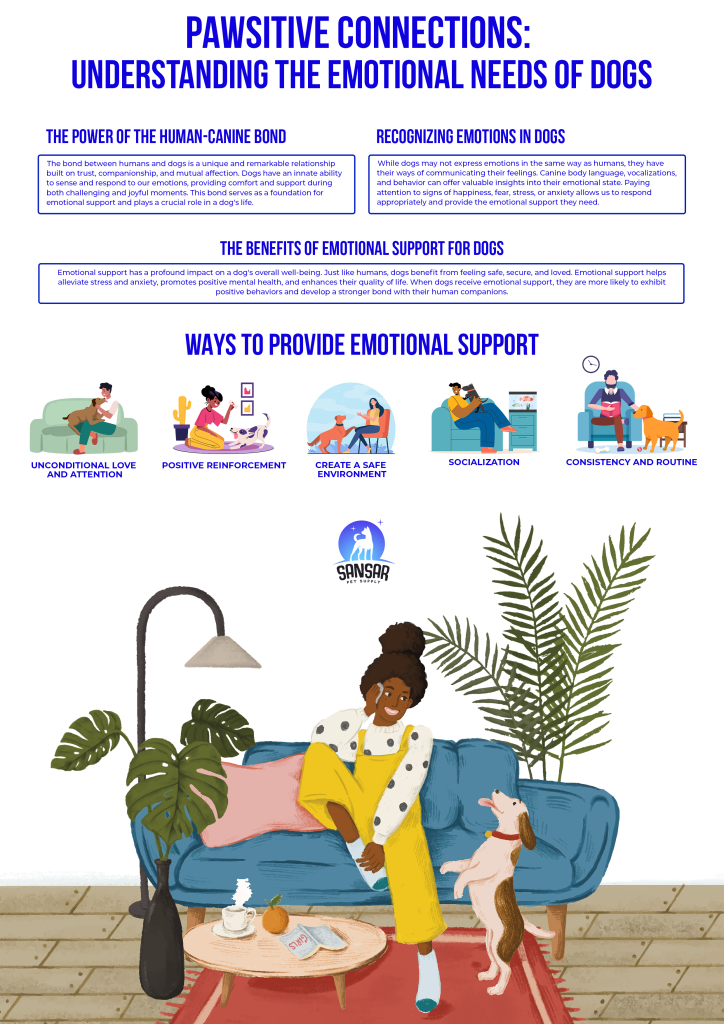Introduction:
When we think of emotional support, humans often come to mind. However, it’s essential to recognize that dogs, too, have emotional needs that require understanding and nurturing. Social animals form deep connections with their human companions and experience a wide range of emotions. In this blog, we’ll delve into the emotional world of dogs, exploring the significance of emotional support and the benefits it brings to their overall well-being.
The Power of the Human-Canine Bond
The bond between humans and dogs is a unique and remarkable relationship built on trust, companionship, and mutual affection. Dogs have an innate ability to sense and respond to our emotions, providing comfort and support during both challenging and joyful moments. This bond serves as a foundation for emotional support and plays a crucial role in a dog’s life.
Recognizing Emotions in Dogs
While dogs may not express emotions in the same way as humans, they have their ways of communicating their feelings. Canine body language, vocalizations, and behavior can offer valuable insights into their emotional state. Paying attention to signs of happiness, fear, stress, or anxiety allows us to respond appropriately and provide the emotional support they need.

The Benefits of Emotional Support for Dogs
Emotional support has a profound impact on a dog’s overall well-being. Just like humans, dogs benefit from feeling safe, secure, and loved. Emotional support helps alleviate stress and anxiety, promotes positive mental health, and enhances their quality of life. When dogs receive emotional support, they are more likely to exhibit positive behaviors and develop a stronger bond with their human companions.
Ways to Provide Emotional Support
- Unconditional Love and Attention: Show your dog love, affection, and attention regularly. Spend quality time together, engage in play, and establish a routine that includes ample opportunities for physical exercise and mental stimulation.
- Positive Reinforcement: Use positive reinforcement techniques, such as rewards and praise, to encourage desired behaviors. This fosters a sense of accomplishment and builds confidence, promoting emotional well-being.
- Create a Safe Environment: Dogs thrive in a safe and secure environment. Provide a comfortable resting place, access to fresh water and nutritious food, and ensure they have a quiet space to retreat to when they need solitude.
- Socialization: Socialize your dog with other dogs and humans to help them develop strong social bonds and build trust. Controlled interactions with well-behaved dogs and exposure to various environments can boost their confidence and emotional resilience.
- Consistency and Routine: Dogs find comfort in consistency and routine. Establishing a predictable schedule for feeding, exercise, and rest helps create a sense of stability and security.
Conclusion:
As sentient beings, dogs require emotional support just like humans do. Understanding their emotions, nurturing their well-being, and fostering a deep bond is crucial in providing the emotional support they need. By embracing our roles as compassionate and attentive caregivers, we can create a harmonious and enriching environment where our dogs feel loved, supported, and emotionally fulfilled. Let’s cherish and reciprocate the unwavering love and companionship our dogs offer us by being there for them at every step of their emotional journey.







